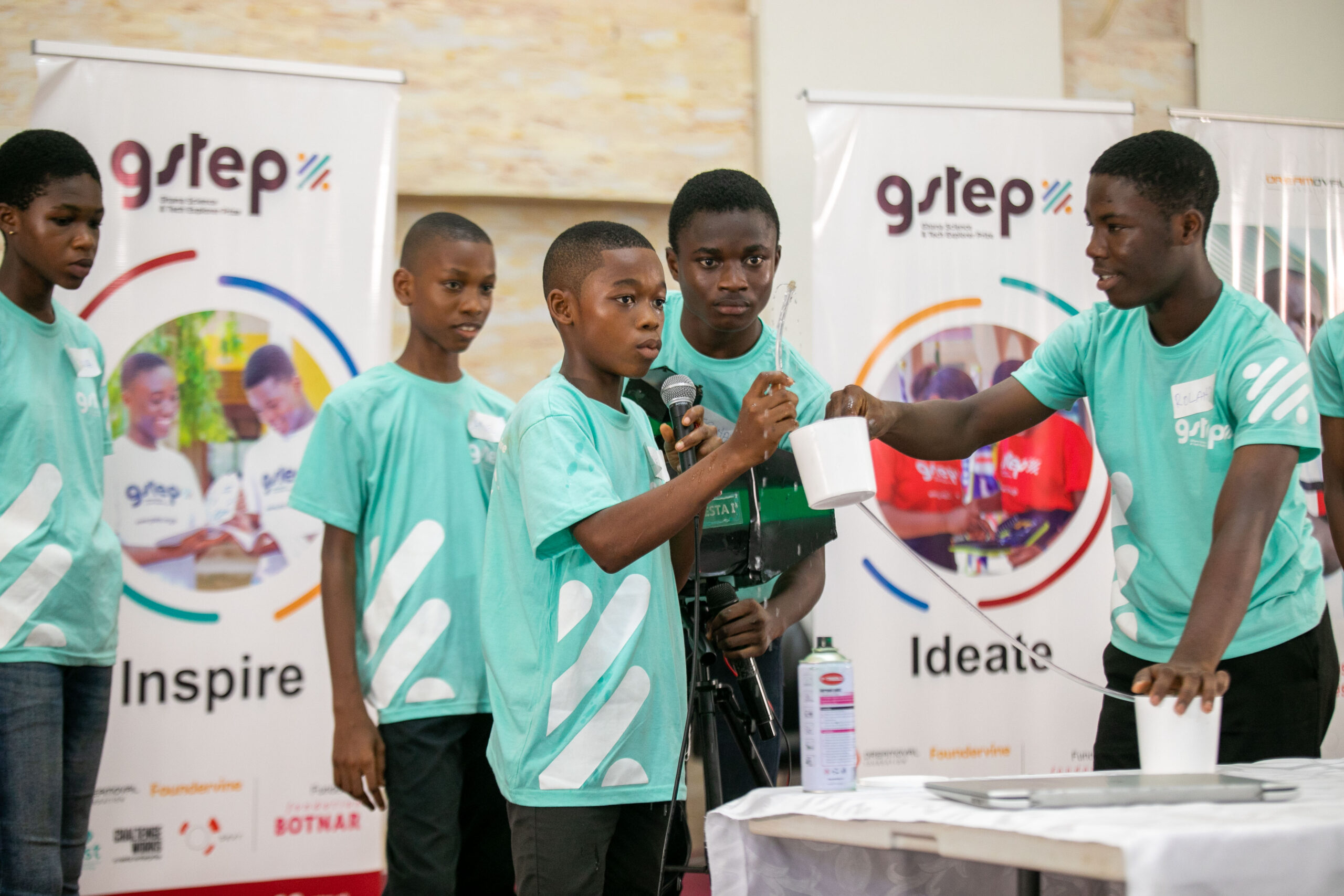
Upon witnessing the highest level of innovation and resilience in Science, Technology, Engineering and Mathematics (STEM) among junior high school (JHS) students at the Ghana Science & Tech Explorer Prize (GSTEP) Exhibition and Awards Ceremony 2025, the Deputy Minister of Education, Clement Abas Apaak, is optimistic that the future of Ghana is transformative.
Speaking on behalf of Minister for Education Haruna Iddrisu, he emphasised the critical role of STEM in addressing disparities in Ghana’s education system and unlocking the potential of the nation’s youth.
GSTEP is a nationwide initiative that engages JHS students from three regions aged 11–16 in developing STEM-based solutions to address local community issues. This year, 50 finalist teams from the Greater Accra, Eastern and Ashanti Regions showcased their projects after being selected from over 1,500 applicants and receiving mentorship from business and technical experts.
Dr. Apaak emphasised that STEM is not just a curriculum, but a tool for equity. He highlighted how initiatives like GSTEP are helping bridge rural-urban and socio-economic gaps in education by empowering students with practical skills and opportunities.
The GSTEP 2025, held at the National Theatre in Accra, under the theme ‘STEM Education and Its Role in Addressing Disparities in Education and Infrastructure Access in Ghana’, brought together the 50 finalist teams of JHS students who presented real-world innovations aimed at solving local challenges, ranging from traffic safety to eco-friendly fuel solutions.
The minister praised the GSTEP Challenge, organised by the DreamOval Foundation and partners, for empowering JHS students to develop real-world solutions.
The Ministry of Education and Ghana Education Service pledged continued support for GSTEP, aiming to scale the initiative nationwide and embed hands-on STEM learning across all schools.
Key government initiatives for STEM, ICT and digital jobs
The deputy minister highlighted the government’s initiatives targeted at promoting STEM education, ICT development and digital job creation.
In the field of STEM, he mentioned initiatives such as the ‘SmartStart Curriculum,’ which integrates STEM, coding and digital literacy into basic education curricula. The ‘Free Laptops/Tablets’ for SHS students and the ‘Curriculum Reform’ will integrate STEM, agriculture, vocational skills, digital literacy, civic education, design thinking and life skills into secondary education outcomes.
ICT initiatives:
The ICT interventions included ‘Digital Literacy’, promoting digital literacy at the basic level through computer facilities and ICT laboratories. The construction of ‘ICT Laboratories’ seeks to upgrade existing and establish new ICT laboratories in schools across the country.
Others include ‘Practical ICT Skills’, improving accessibility to modernise education facilities for persons living with disabilities and creating an information hub/portal, as well as ‘ICT Centres’ in underserved areas for shared access to computers and Internet.
Digital jobs initiative:
This programme entails the ‘One Million Coders Programme’ to train one million young Ghanaians in digital skills like coding and software engineering; and the ‘Regional Digital Centres’ for business process outsourcing and knowledge process outsourcing.
The government has also initiated a ‘FinTech Growth Fund’ which establishes a US$50million fund to support digital entrepreneurs and FinTech companies. Also included are Zonal ICT Parks across the country to create jobs and make Ghana a hub for innovation and cybersecurity.
Dr. Apaak emphasised that STEM education is not a luxury; it is a necessity. It is the great equaliser, providing all children, regardless of where they come from, with the tools to think analytically, solve problems and contribute meaningfully to their communities.
“Through STEM, a student in Doninga, located in the Builsa South District of the Upper East Region, can design a water purification system for her village just as easily as a student in Adenta can develop a traffic control prototype for urban Accra,” he said.
GSTEP Founder, Constance Agyeman, in her remarks, reiterated that GSTEP is a national challenge fostering innovation among JHS students through mentorship and hands-on STEM projects.
“The GSTEP Challenge continues to bridge the gap between classroom theory and real-world application, empowering the next generation of STEM innovators in Ghana,” she said.
She mentioned that with the right support and investment, it would be expanded beyond the three regions in the next edition.
Top winners:
Team Technocrafts Innowear from Services Primary and JHS, Burma Camp, in the Greater Accra Region, has emerged as the champion of the 2025 Ghana Science and Tech Explorer Prize Challenge.
The team of six smart and innovative young ‘STEMpreneurs’ developed an innovation inspired by a real-life kidnapping incident involving a team member.
The first runner-up was team SCI-G from the Eastern Region while the second runner-up was team Eco-Fuel Agenda, representing Ashanti Region.
Provided by SyndiGate Media Inc. (Syndigate.info).